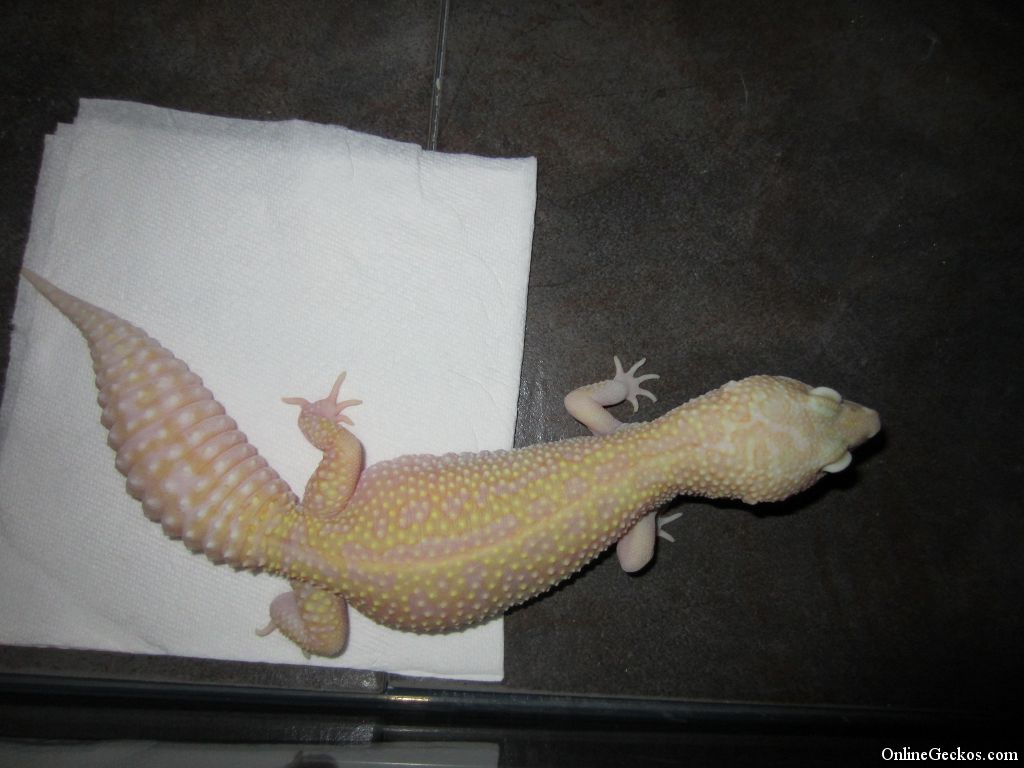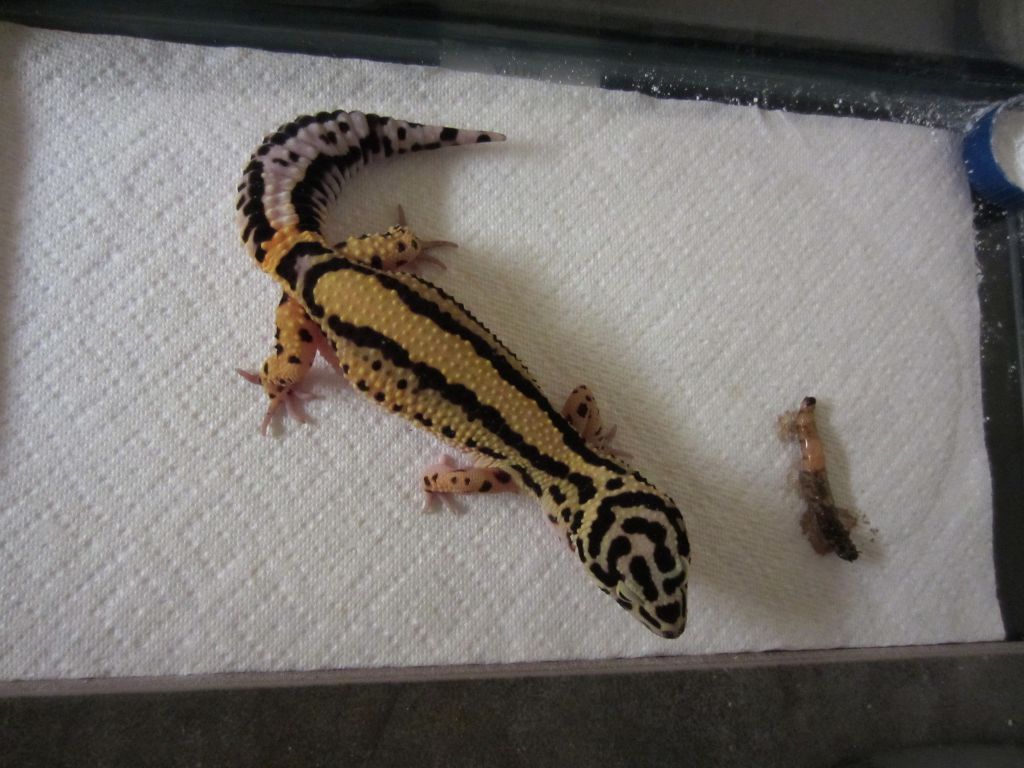I'm late to the thread but I feel I should chime in on the potential dangers of superworms. Here's our story..
On Jan. 16th around 1am in the morning, I fed my beautiful super giant mack snow raptor a superworm. It was really just a treat, as she usually gets dubia roaches every other day. But she was looking through the tank, looking cute, so I dropped a superworm in the tank for her.
She gobbled up the worm, didn't get to chomp on the head and just swallowed it pretty much. I was instantly worried when I saw it, so I hopped online to start researching. Every sites/posts I've read, everybody said superworms are 100% safe, that all negative things said about superworms are myth. People suggested that a gecko's stomach acid would kill it instantly if the superworm isn't already dead going in. Anybody that attempted to suggest superworms could cause injuries to geckos were instantly shot down, called liars, called names, etc.. So having read that, I went to sleep feeling a bit better.
Next day everything carried on as usual. I noticed seeing her out and about a couple of times, didn't think much of it at first. Around 1pm I noticed there was a superworm on the floor of the tank, regurgitated, and fully intact. That's when I knew something was wrong, so I opened up the tank, and saw this:
http://www.onlinegeckos.com/media/superworm-injuries/superworm-injuries1.jpg
*The reason I'm putting these in as links and not embedding pictures directly into the thread, is because these pictures are graphic. So click on it on your own free will, but be warned they are images of blood, poop, and the nasty stuff.
I was horrified, and instantly panicked. The feeling was like witnessing something bad that just happened to your family/friends. I got really sick. And here's a pic of the regurgitated superworm:
http://www.onlinegeckos.com/media/superworm-injuries/superworm-injuries2.jpg
My poor gecko looked so pale and white, I thought for sure she was dead:
http://www.onlinegeckos.com/media/superworm-injuries/superworm-injuries3.jpg
Over the course of two weeks straight, she defecated blood at least twice a day. They looked like this:
http://www.onlinegeckos.com/media/superworm-injuries/superworm-injuries4.jpg
I did take her to the vet, an exotics animal vet that is familiar with leopard geckos. He was surprised she lived past the first day after seeing the pictures. But aside from that, he couldn't tell me where she was bleeding internally, he had no way to stop the bleeding. He even prescribed me Metronidazole, which is an antibiotic used to treat parasite infections. He thought the bleeding may have come from parasites, which I said was not the case.
But I took the dose home just in case, and went and got a fecal exam to make sure she did not have any parasites. The fecal exam came back negative, no parasite infection. I end up not giving her any antibiotics because blind treating her may end up making her weaker.
The vet also prescribed Carafate, which as explained to me is like a pepto-bismol for reptiles. Now that's something I could definitely see help, so I followed the instructions and gave her a smaller than instructed dose of it for a few days.
On the 3rd week, she finally stopped defecating blood. And a few days ago, she pushed out this pile of junk:
http://www.onlinegeckos.com/media/superworm-injuries/superworm-injuries5.jpg
I never thought I would get so excited looking at poop, but I really was excited looking at a poop that was not in a pool of blood. And two days ago, she started acting like she wanted to eat. There was a routine where when I opened the tank, she would poke her head out if she wants to eat, and she did that two days ago. So I fed her a dubia roach, she ate it without hesitation. I was honestly worried right then as maybe eating would've reopened whatever wound she had.
But I'm glad to say, she defecated without blood again, so looks like she fought through it and will be OK now :yahoo:
Here she is, still a bit pale, but she's starting to get color in her once again:
Compare this to when she was completely healthy, she has a ways to go yet. But at least she fought through it and she looks like she'll be fine. This is a video taken in December when she was healthy:
http://www.youtube.com/watch?v=eyYXeZphJyA
So if anybody ever has any doubts superworms can cause injuries to a leopard gecko, or even death, I hope this puts rest to that. Superworms have incredibly strong mandibles. Have you ever held a superworm and pressed your finger against its mouth? It'll bite, and you will hurt. That's how strong their mandibles are. If they can bite hard enough for us human skins to feel it, imagine what they can do inside a gecko's body.
Also by the looks of the regurgitated worm, it sure didn't look like it was dissolved in any way. So for people to suggest superworms will die of stomach acid right away is also wrong. The superworm will die eventually, but the problem is, what damages would it cause inside a gecko's stomach before dying?
Now I'm not advocating to stop using superworms completely. We still use superworms here, but we no longer just feed them anymore. We pinch their heads (which in effect breaking their mandibles). Some people don't want to do that because it's messy and takes time, but to know there's a chance your gecko could bleed out like mine did, or maybe die, do you really want to take that chance?
People can say this is a super rare occurrence, but I have doubts about that. In the internet age, we are finally seeing more people report such things on forums and on websites. Where as 10 years ago things like this could happen and nobody would know about it. Also the reptile vet I went to thought the blood came from parasite infection. That leads me to believe other people may have taken their geckos to vets when they saw blood in the poop, and be given antibiotics and called it a day. Some may have their geckos die and a novice owner would not even know the death may have been caused by a superworm.
To prove this isn't all that rare, just 2 weeks after this incident, we had another gecko that ate a superworm wrong. (This was prior to us deciding to pinch all superworm heads) She violently regurgitated this superworm after not chomping its head while it went in. She stopped eating for a few weeks due to it.
Fortunately she did not bleed, so apparently the superworm didn't do the same type of injuries to this gecko. But it was bad enough for this gecko to regurgitate the superworm violently and stop eating completely. So twice in two weeks, rare? I must be just having bad luck if this is truly rare.
Anyways, on a brighter note, you guys notice how all the pics of the poop and blood were on the paper towel? This awesome gecko walked out of her hide to the corner even while she was really sick and bleeding internally, and she never made a mess outside of that corner. This is one special dear pet, and I'm so glad she fought through it. I was feeling really bad and responsible because I'm the owner that fed her a big juicy superworm. I listened to others that superworms were 100% safe and that pinching heads was not necessary. My pet almost died due to it, never again.
That's our story, again I'm not advocating to not use superworms at all. But I feel it's important for people to know the potential risks, and that you can always play safe and just pinch their heads to break their mandibles before feeding them to your geckos. Good day




